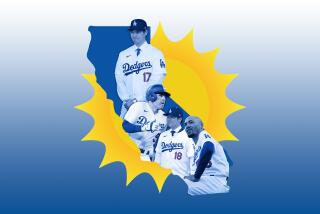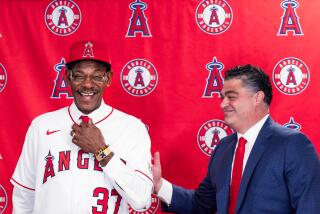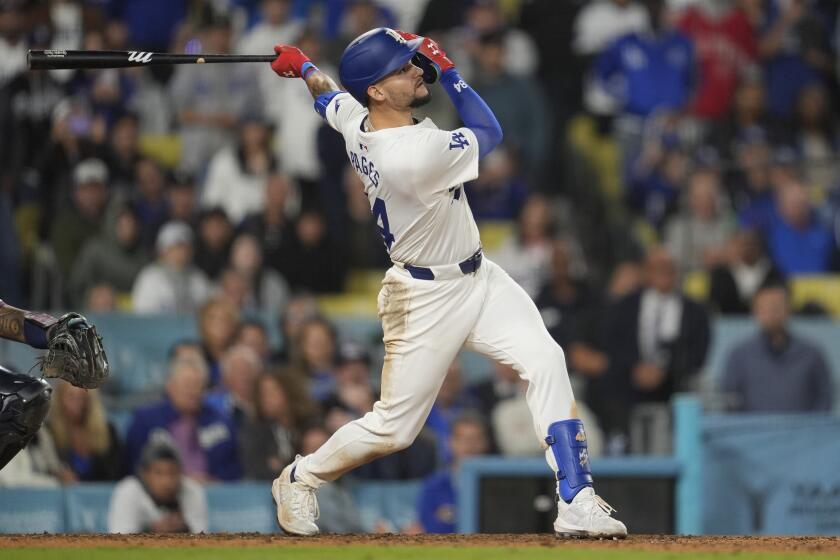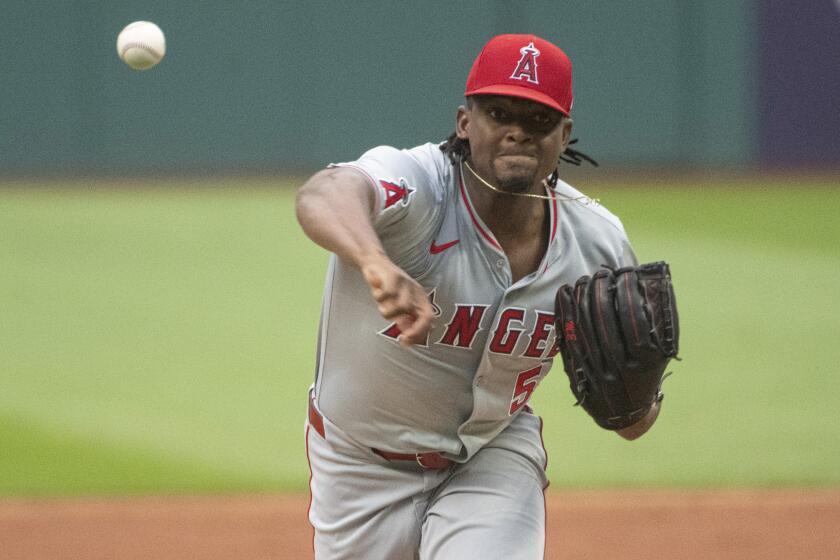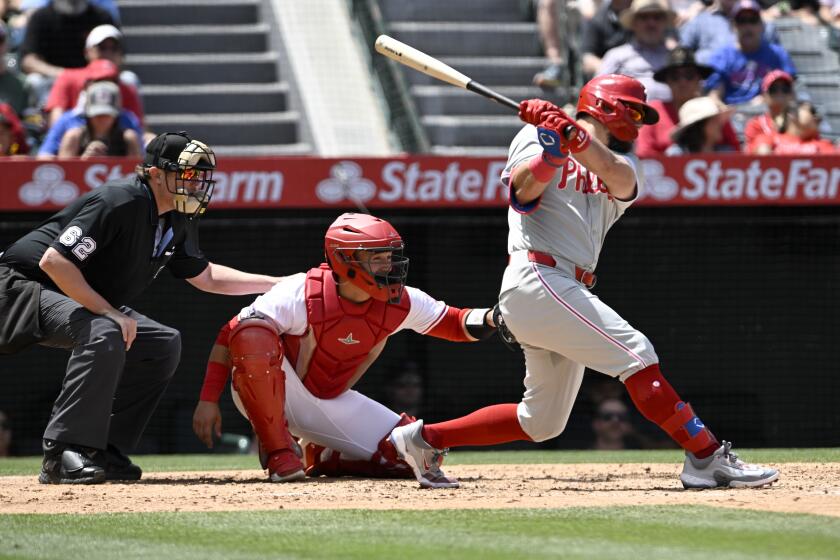CORPORATE REPORTS
The reviews were so gushing back in 1995, you’d swear the Walt Disney Co.’s $140-million purchase of the Angels was going to save a sport ravaged by a nasty labor dispute and revitalize a county devastated by bankruptcy with one swift swing of the bat.
“What a shot in the arm for Orange County,” said William G. Steiner, county supervisor.
“We’re as happy as the devil over here,” Anaheim City Manager James D. Ruth said.
Commissioner Bud Selig welcomed one of the world’s most renowned marketing companies. Agent Leigh Steinberg said Disney “is no Cinderella in sports--they’re for real, and they’re taking the business to a new level.”
One Orange County columnist said Disney’s acquisition of the Angels “might be the best news for baseball since the birth of Ken Griffey Jr.”
Through all the acclaim came one voice of dissent. It was Alan Friedman, editor of Chicago-based Team Marketing Report.
“It won’t be quite as easy with an existing baseball team as it was with a new hockey team,” Friedman said. “They walked into a wonderful [hockey] situation--a great facility, a virgin market and a hot sport. Those situations don’t exist with the Angels. I don’t think it can be quite the windfall they had with the Mighty Ducks.”
Does this guy have any stock tips too?
Friedman was downright clairvoyant. In four years, Disney’s Angels have at least $70 million in operating losses. After drawing 2.5 million fans to a renovated stadium in 1998, attendance slipped to 2.25 million in 1999 and could dip dramatically this year--season ticket sales are off 15% for a pitching-deficient team expected to finish last in its division.
Under Disney’s reign, two managers and one general manager have resigned, the Angels are on their sixth marketing boss, and Angel merchandise ranks 22nd among 30 major league teams in sales.
Sandwiched around second-place finishes in 1997 and ’98 (though both included September collapses) was a last-place finish in 1996 and an even more dismal last-place finish in 1999, when a team picked to win the American League West title collapsed under a deluge of dissension.
While Disney has been praised for turning cavernous Anaheim Stadium into intimate, fan-friendly and upscale Edison Field and signing free-agent first baseman Mo Vaughn in November 1998, its performance in most baseball-related matters has been panned.
There was the Tony Phillips fiasco in 1997, when the Angels suspended the second baseman after he was arrested on drug charges, only to be ordered to reinstate Phillips by an arbitrator who admonished the Angels for trying to supersede baseball’s clearly established drug policy and turn the issue into a moral tug of war between Disney and baseball.
There was the 1997 failure to trade for Mark McGwire when the slugger--who went on to hit a record 70 home runs and become a huge gate attraction in St. Louis in 1998--made it clear he wanted to play in Anaheim.
There was the 1998 failure to bolster a pennant-contending team at the July 31 trading deadline, while the Texas Rangers acquired shortstop Royce Clayton, pitcher Todd Stottlemyre and third baseman Todd Zeile and swept five September games against the Angels to win the West.
Then there were the awful deals the Angels did make: Damion Easley for Greg Gohr. J.T. Snow for Allen Watson. Chili Davis for Mark Gubicza. Phil Nevin for Andy Sheets.
Under Disney, the Angels have not made one trade--with the possible short-term exception of Jim Leyritz for Ken Hill in 1997--that has significantly bolstered the team, though they could mount a comeback with the recent trade of Jim Edmonds for Kent Bottenfield and Adam Kennedy.
There was the colossal disappointment of 1999, after the Angels had signed Vaughn and pursued pitcher Randy Johnson, only to suffer through an injury-plagued, turmoil-filled 70-92 season.
That was followed by another major letdown, when a new Angel regime headed by General Manager Bill Stoneman made no attempt to re-sign its best pitcher, Chuck Finley, and until last week’s trade of Edmonds did nothing to improve the Angels this winter, leaving many to wonder exactly what direction this franchise is headed.
The Angels are about to start 2000 with a shaky rotation, and interest in the team has waned so much the Angels have resorted to offering half-price tickets to Monday night’s season opener against the two-time defending World Series champion New York Yankees.
When Orange County high-tech billionaire Henry T. Nicholas III inquired last year about acquiring interactive broadcast rights to the Angels--and Mighty Ducks--Disney eagerly offered to sell him the money-losing teams. After four months of negotiations, Nicholas and his investment partners backed away.
Now, beginning the fifth year of ownership, when Disney might reasonably have worked out the kinks and developed a realistic vision for a winning team and a cohesive marketing strategy, the Angels are coming off a disastrous season with little hope for 2000, and the team president acknowledges the company has no idea whether it wants to own a baseball team.
“He’s not passionate about having to own this team,” Angel President Tony Tavares said of Disney Chairman Michael Eisner. “If somebody came to him with the right offer, would he get out? Yes. It’s not necessarily part of Disney’s core strategy any more. He’s accomplished what he set out to do, which is to ensure that major league baseball stays in Anaheim.”
The rest of baseball has noticed Disney’s ambivalence.
“They haven’t gone into this headfirst,” one high-ranking National League executive said. “They haven’t turned the Disney spigot on. They haven’t thought of it like a new theme park, something to maximize the brand.
“They did a decent job with the stadium, which was a good creative solution to a problem. But you can tell that the company is not really behind it in a big way.”
A Push for Farm Aid
Eisner, who declined to be interviewed for this story, visited Tempe, Ariz., last spring to check out his baseball team and meet the company’s latest, greatest attraction--Mo Vaughn.
These were head-spinning days for the Angels, who shelled out $80 million to sign Vaughn and made legitimate runs at star pitchers Johnson and Kevin Brown.
Long dormant in the high-end free-agent market, Disney began flexing its financial muscles and seemed poised to join teams like the Yankees and Indians on the big-budget block.
“We sat down last summer and talked about a strategy,” Eisner said at the time. “We could either cut back and be competitive; stay in the middle, where we weren’t competitive but we weren’t an embarrassment; or we could be really competitive, step it up and try to put people in the seats.
“I think people finally realize we’re not going to do short-term things, that we’re in for the long haul. We’re going to be fiscally responsible, but not cheap.”
So, what happened? All the Angels did this winter was reinforce the perception they’re paring the team for a possible sale.
They let Finley go. Though there were no marquee free-agent pitchers available, there were plenty who could help the Angels, and Stoneman made no attempt to sign any.
The payroll fell from about $55 million to about $51 million. One year after signing Vaughn, the Angels signed 42-year-old knuckleballer Tom Candiotti and journeyman left-hander Kent Mercker to minor league contracts. Stoneman touted the Angels’ young pitchers as viable alternatives, even though he’d never seen them perform.
Several players, including right fielder Tim Salmon and closer Troy Percival, voiced their frustration after Finley’s departure, saying they wanted no part of a rebuilding program.
Tavares had criticized previous Angel regimes for waffling in their approach--one year the Angels spent heavily on free agents, trying to win a championship for owner Gene Autry, and two years later they’d start a youth movement.
Now it was Disney’s Angels who did a flip-flop, going from a win-at-all-costs mode to a build-from-within philosophy, a change that was reinforced by their hiring of rookie Manager Mike Scioscia, who signed a three-year, $1-million deal, and bypassing of the popular and more expensive Don Baylor.
“They sent some mixed signals,” former Angel president Richard Brown said. “You don’t say you have a five-year plan if you expect to win in the current year or the next year.”
Tavares acknowledges that the Angels “have wandered a bit. . . . We haven’t changed directions, but we haven’t been as focused as we should have been. Whether we own this franchise or somebody else comes in, it’s critical that you have the kind of foundation the Atlanta Braves have, where, when you go through the kind of crisis situation we went through last year, you can solve a lot of your own problems, as opposed to having to go into a marketplace that knows you’re in trouble.”
To that end, Stoneman has embarked on an ambitious plan to revitalize a barren farm system that Baseball America recently rated 30th of 30 teams. This, Stoneman and Tavares agree, is where the Angels’ philosophy has changed dramatically.
“Looking three, four, five years down the road, I see us headed toward a highly skilled, very athletic ballclub, with players who have multiple tools, in particular, running speed and strong arms,” said Stoneman, who spent 16 years in the Expos’ front office before coming to Anaheim.
“That was the direction I’m used to, and that’s proven. It works, not just in the win-loss column but in terms of fan excitement.”
Stoneman hired an aggressive young player personnel director from the Yankees, Donny Rowland, and replaced a dozen scouts (though two have threatened an age-discrimination suit against the team). The Angels tripled their budget for scouting and development in Latin America, and recently signed 12 players from those talent-rich countries.
Former GM Bill Bavasi and player personnel director Bob Fontaine had a more conservative draft approach, using top picks for college players who were closer to being big-league ready rather than less refined high school players, but Stoneman and Rowland will have a different philosophy:
“Let’s go play big casino,” is how Tavares describes it. “When you look at the draft picks we’ve made in the past five years, there isn’t anybody that’s really high-ceiling, where you say, ‘This guy is a potential star.’ We have a lot of people we’ve selected who will play in the big leagues, but they have limited upsides.
“With Donny and Bill, we may select seven guys with real high ceilings. You’ve got to accept that four of those guys will be total busts, one might be a star and maybe another will be an average major league player. You won’t get as much quantity as far as people making big league rosters, but you’ll get No. 1 pitchers and players [at premium positions] like shortstops. That’s what we’re going for.”
The problem, Stoneman says, is that much of his work over the winter was invisible to fans and media who were clamoring for the Angels to win now and expected major changes after last year’s debacle, especially after Tavares said, “Somebody told me, ‘You can’t trade 25 guys.’ I said, ‘Why not?’ ”
Said Stoneman: “I know how it looked, like we were sitting [around] and not doing anything, but the media and fans don’t find a lot of excitement talking about your scouting department. The fact that we’re turning up the dial in Latin America is significant. If you have faith in your scouts, like I do in ours, you believe they’ll come up with something good.”
While Stoneman was concentrating on player development, his reputation around the big leagues took a beating. His excessive demands in trade talks frustrated other general managers, and his inactivity baffled fans and baseball executives.
“I think they had to make some changes, but I don’t think they’ve made the right selection in their changes,” one American League executive said. “They needed a forceful guy to come in and make a lot of changes and shake things up, and that’s not happening.”
Stoneman, however, stressed patience, saying he would only make a deal that would help the club, and last week’s trade, in which the Angels may have plugged two holes by dealing an excess outfielder, was a strong response to his critics.
Tavares also challenged those who criticized the Angels for placing more emphasis on the farm system than winning in the present.
“Have we reduced our payroll? Are we heading in the direction of mass cutting?” Tavares asked. “I don’t think we’ve done anything that even resembles that. By definition, when you’re in a cutting mode, you trade players with high salaries for prospects. We’re interested in fixing the problems we have.”
Stoneman added that the possibility of the team being sold has had no bearing on his decisions.
“I haven’t had a conversation with anyone at Disney saying we want you to operate this way to help us sell the franchise,” Stoneman said. “I’m not sure if I have to stand on my head to make people understand that, but that’s not the directive I’ve been given. As this club is constituted, we can win now and build for the future.”
But will the future of Disney’s Angels include the pursuit of high-end free agents like Vaughn? That’s doubtful. Stoneman’s ideal situation is to have top prospects groomed and ready for the big leagues and to only plug holes with free agents when absolutely necessary.
“If it would mean compromising the club’s ability to scout and develop players, it would be a tough decision,” Stoneman said. “We know the fans and media get emotional, but we have to maintain our discipline.”
Synergy Never Realized
Tavares calls the stadium renovation “the highlight of our ownership,” and Selig lauds Disney for doing “marvelous things with their stadium.” In addition, ownership anxieties that Disney might try to buy a winner have been eased. It was Fox’s Dodgers, not Disney’s Angels, who made Kevin Brown baseball’s first $100-million player.
“I think they’ve been a better baseball partner than other teams first expected,” Richard Brown said, “certainly better than Fox.”
With Disney’s marketing muscle, many thought the Angels would finally shake the shadow of the Dodgers and develop a national following, but merchandise and ticket sales have fallen far short of expectations, and kids never clamored for Disney-designed Angel merchandise as they did for Mighty Duck gear.
Disney also no longer needs the Angels for what Tavares called “the biggest synergistic opportunity,” a proposed regional sports cable channel to rival Fox Sports Net. Disney coveted the Angels as the foundation for summer programming on its ESPN West channel, but the company abandoned the concept two years ago.
The promised synergy among the Angels, Ducks and Disneyland also collapsed. A recent visit to the Disneyland Web site, at a time when the baseball season is fast approaching and families are planning summer vacations, revealed no Disneyland travel packages that included Angel games and did not include a link to the Angel Web site.
The absence of those strategic fits does not mean the Angels do not fit for Disney, said Sandy Litvack, senior executive vice president and chief of corporate operations.
“Does it add to our bottom line? Of course not,” Litvack said. “Does it advance our corporate interests? It is only a small part of a total picture. Anaheim is important to us. The club is important to us. We’d like to see it be a winner, and it helps us as a company if we can be winners.”
When Disney assumed operating control of the Angels in 1996, Tavares said “if they can average 2.5 million fans with a marketing effort that was not viewed by their peers as being exceptional, then with our marketing skills I feel confident we’ll be able to get [almost] 3 million people a year.”
That kind of hubris outraged executives from the Autry regime, who attributed their shortcomings to a minuscule marketing budget.
“Yes, they’re the preeminent marketer in the world, but until you learn the product you’re marketing, you’re not going to be able to use those skills,” Brown said. “I don’t think Disney understood the baseball fan. If they had, they wouldn’t have had bands or cheerleaders on the dugouts.”
Guilty as charged, Tavares said.
“The smartest guy is the newest owner,” he said. “He’s got things he wants to try.”
Disney’s raucous entertainment alienated loyal fans without drawing new ones. The bands and cheerleaders disappeared after the first year. Nothing sells better, Disney eventually discovered, than a winning team.
A $5-million ad campaign for the debut season of Edison Field helped boost attendance to 2.5 million. Disney added Spanish radio and television broadcasts and embarked on the first Spanish-language ad campaign in franchise history, courting a Latino audience ignored by the Autrys.
Some promotional ideas worked--Disney noticed large crowds for fireworks nights, so now every Friday is fireworks night. But some didn’t--the Angels drew the Yankees for the Labor Day weekend last year, a marketer’s dream, but instead of featuring Derek Jeter and Bernie Williams in ads, they promoted Hot Wheels Night.
Five marketing chiefs have come and gone since Disney took over, with some leaving for better job opportunities and some ousted “because I wasn’t hiring the right guy,” Tavares said.
Marketing is not the only department with a revolving door. Of the four vice presidents listed in the Angels’ 1997 directory, three are gone. Of the six directors of various business operations, four are gone. The ticketing operation has been so chaotic that Disney had to rehire the Autrys’ ticket manager, who was fired when Disney took over.
Disney, like several corporations that own more than one sports franchise, combined the business operations of both. What seemed like a logical idea--the Angels play in the summer, the Ducks in the winter--developed into a disaster, with exhausted employees working into the evenings on game nights year-round, without an off-season to recover. Many quit.
“One of the biggest mistakes we made was trying to put both together,” Tavares said. “I take full responsibility for underestimating the amount of work that had to be done.”
Tavares a Constant
Through all the bad trades, the disappointments on the field and at the turnstile, the heavy turnover among coaching, front-office, executive-office and business staffs, there is one constant: Tavares.
Some have likened him to Yankee owner George Steinbrenner because of his tyrannical tendencies. One of his first moves was to slap a gag order on Angel scouts, because he was convinced they were leaking word about trade talks and damaging the team’s negotiating position.
Tavares will go months without speaking to reporters, then make several emotional outbursts as he did last summer, when he likened the Angel clubhouse to “a day-care center” and threatened to trade all 25 players.
He’s a micro-manager who has been known to fly into a rage if he discovers a cold hot dog at the stadium and go directly to the concession stand to investigate. His macro-managing skills have been criticized, as well.
After Bavasi’s departure last fall, he described a front office full of longtime Bavasi associates as “incestuous,” and ripped himself for not realizing it sooner and doing something about it.
Last June, in confirming the Angels were on the verge of signing Manager Terry Collins to a contract extension, he said, “From what I can see, everything looks fine. Neither Bill [Bavasi] nor I see any problems in that locker room.”
The next day, several Angels met with Bavasi to complain about Collins in a mini-mutiny that divided the team, punctured the manager’s authority and showed that Tavares--and Bavasi--didn’t exactly have their fingers on the pulse of the clubhouse.
Tavares, whose background was in arena management before taking over the Ducks and Angels, has his supporters. Peter Ueberroth, the former baseball commissioner, said Tavares “has been an excellent executive, and I’ve heard baseball owners speak very highly of him.”
“I think Tony has done a very good job,” Litvack said. “I don’t mean to dump on prior ownership, but Tony inherited a situation where there was a history of the team not having won. He has had to put a lot of people in place, and he has had to change attitudes. I think he’s been making moves in the right direction.”
Though many questioned his hiring of Stoneman and Scioscia, saying the Angels pursued the least expensive--instead of most qualified--candidates, Tavares should be credited for at least acknowledging that what the Angels had wasn’t working and for trying a new approach.
It was also Tavares who was able to persuade Eisner to loosen Disney’s notoriously tight purse strings so the Angels could pursue Vaughn and a premier pitcher in the winter of 1998-99, even though such expenditures would guarantee huge financial losses.
But it should be noted that numerous baseball executives, when asked about the Angel front office, either declined comment or spoke on the condition their names not be used.
“That should be a dynamite franchise in a dynamite market,” one high-ranking baseball official said.
Maybe it would have been had 1999 gone differently.
It’s difficult to overstate the magnitude of the Angels’ flop last season. They were a consensus pick to win the West title, and Eisner playfully jabbed Fox chief Rupert Murdoch by proclaiming Fox’s Dodgers were now “the lesser team in the market.”
If the Angels had won, Vaughn’s signing would have looked like a stroke of genius, home attendance might have smashed the franchise record of 2.8 million, they probably would have re-signed Finley or pursued another free-agent pitcher, and they could have carried that momentum into 2000.
“It would have been a great building block,” Tavares said. “Unfortunately, through a series of uncontrollable events, starting in spring training with [shortstop Gary] DiSarcina being knocked out [by a broken arm from a stray fungo bat] . . . everybody goes into the season expecting to grow and get better, and the reverse happens.”
It’s the same with Disney’s ownership of the Angels. Everyone thought Disney was in this for the long haul, that Disney would transform the Angels into a model organization, one that would enhance baseball’s reputation and be a dominant force in Southern California, and the reverse happened. Their commitment to baseball seems lukewarm at best.
Litvack insists Disney did not seek out Nicholas last summer and is not seeking out buyers now.
“The team is not for sale,” Litvack said. “We can’t ever discount the possibility of someone coming along and making a fabulous offer. But we are not in any way trying to sell the team.
“We are committed to making it a winner. You don’t quit when you’re not winning.”
If Disney does not sell the Angels--and Ducks--in the next 12 to 18 months, Tavares said, “my guess is that these teams will be owned by the Walt Disney Co. for at least the next 20 years.” By then, perhaps, Disney can become the force in baseball that so many expected. Then again, maybe baseball is so screwed up that not even Disney can make it work.
“I don’t know if Disney came in brash, but they probably did look at the baseball industry and say, ‘You know what? We can do that. We’ve built parks in Paris and Japan or wherever, and we can do this,’ ” one American League executive said. “Well, you know, a funny thing happened along the way. This is one animal no one has control of.”
Staff Writer Tim Brown contributed to this story.
(BEGIN TEXT OF INFOBOX / INFOGRAPHIC)
UNDER DISNEY
Seasons: 4
Record:
309-338 (.478)
Playoff appearances: 0
Best division finish: 2nd, 1997 and ’98
President: Tony Tavares (fifth season)
General manager:
Bill Stoneman
(first season)
Manager:
Mike Scioscia
(first season)
Payroll:
1999--$55 million
2000 (projected)-- $51 million
More to Read
Go beyond the scoreboard
Get the latest on L.A.'s teams in the daily Sports Report newsletter.
You may occasionally receive promotional content from the Los Angeles Times.

